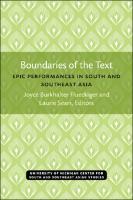Boundaries of the Text
Epic Performances in South and Southeast Asia
Contributor(s)
Burkhalter Flueckiger, Joyce (editor)
Sears, Laurie (editor)
Language
EnglishAbstract
When the Mahabharata and Ramayana are performed in South and Southeast Asia, audiences may witness a variety of styles. A single performer may deliver a two-hour recitation, women may meet in informal singing groups, shaddow puppets may host an all-night play, or professional theaters may put on productions lasting thirty nights. Performances often celebrate ritual passages: births, deaths, marriages, and religious observances. The stories live and are transmitted through performance; their characters are well known and well loved. Yet written versions of the Mahabharata and Ramayana have existed in both South and Southeast Asia for hundreds of years. Rarely have these texts been intended for private reading. What is the relationship between written text and oral performance? What do performers and audiences mean when they identify something as “Ramayana” or “Mahabharata”? How do they conceive of texts? What are the boundaries of the texts? By analyzing specific performance traditions, Boundaries of the Text addresses questions of what happens to written texts when they are preformed and how performance traditions are affected when they interact with written texts. The dynamics of this interaction are of particular interest in South and Southeast Asia where oral performance and written traditions share a long, interwoven history. The contributors to Boundaries of the Text show the difficulty of maintaining sharp distinctions between oral and written patterns, as the traditions they consider defy a unidirectional movement from oral to written. The boundaries of epic traditions are in a state of flux, contracting or expanding as South and Southeast Asian societies respond to increasing access to modern education, print technology, and electronic media.
Keywords
Sociology and anthropologyDOI
10.3998/mpub.19503Publisher
University of Michigan PressPublisher website
https://www.press.umich.edu/Publication date and place
Ann Arbor, 2020Grantor
Imprint
U OF M CENTER FOR SOUTH EAST ASIAN STUDISeries
Michigan Papers On South And Southeast Asia, 35Classification
Sociology and anthropology


 Download
Download